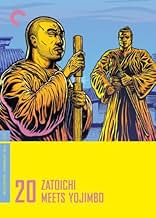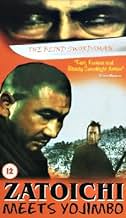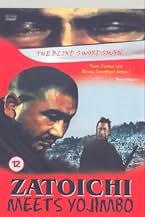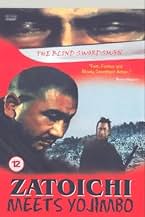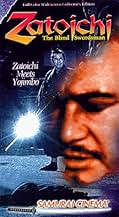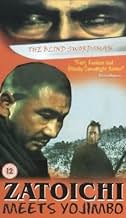IMDb RATING
7.0/10
3K
YOUR RATING
Zatoichi tries to unrest the mob rule over a small village all while the gang leader's bodyguard is actually the Yojimbo, secretly taking the gang down from the inside. Will the two heroes r... Read allZatoichi tries to unrest the mob rule over a small village all while the gang leader's bodyguard is actually the Yojimbo, secretly taking the gang down from the inside. Will the two heroes realize in time that they are on the same side?Zatoichi tries to unrest the mob rule over a small village all while the gang leader's bodyguard is actually the Yojimbo, secretly taking the gang down from the inside. Will the two heroes realize in time that they are on the same side?
- Director
- Writers
- Stars
Masakane Yonekura
- Boss Masagoro
- (as Sakatoshi Masakane)
Shigeru Kôyama
- Jinzaburo Wakiya
- (as Shigeru Kamiyama)
Fujio Tokita
- Blacksmith Tomeyoshi
- (as Fujio Tsuneda)
- Director
- Writers
- All cast & crew
- Production, box office & more at IMDbPro
7.03K
1
2
3
4
5
6
7
8
9
10
Featured reviews
it's good for a one-time viewing, but I'm not sure if I'd rush to see it again
Zatoichi Meets Yojimbo was good as a throwaway movie-of-the-night to watch with friends (friends who were into Zatoichi and old samurai movies), but in the sense of it being something worthy of its stature, it didn't quite deliver. An issue, as some reviewers as well as author Stuart Galbraith (Emperor and the Wolf), was Toshrio Mifune wasn't playing the character really as he was in the Kurosawa films.
In the original Yojimbo and Sanjuro, Mifune crafted a true anti-hero bad-mutha samurai, who was grungy with his scratches, but also very cunning in how he could play both sides or act a little uncouth in his manipulations. Here, one just sees him acting like a stumbling drunk, and even a little like a scummy caricature of Yojimbo. Truth be told, it's meant more for Zatoichi fans- he was a HUGE title character, as played by its star Shintaro Katsu.
The problem there as well is that there have been better Zatoichi movies (I haven't even seen many, but the few I've seen, and as repetitive as they can get, aren't shoehorned plot-wise like so). And this isn't totally to put the movie down, as a cash-in flick it does attempt at making some entertaining segments (and I do like how the two of them decide at first to combine forces, so to speak).
It's entertaining enough, but should be more memorable, as other franchises can get more creative or try different ideas with their stars when trying to combine their vehicle-makers - although if you have come this far anyway with Zatoichi, why stop now. It's even sort of lackadaisically shot and edited, in a very formulaic manner.
In the original Yojimbo and Sanjuro, Mifune crafted a true anti-hero bad-mutha samurai, who was grungy with his scratches, but also very cunning in how he could play both sides or act a little uncouth in his manipulations. Here, one just sees him acting like a stumbling drunk, and even a little like a scummy caricature of Yojimbo. Truth be told, it's meant more for Zatoichi fans- he was a HUGE title character, as played by its star Shintaro Katsu.
The problem there as well is that there have been better Zatoichi movies (I haven't even seen many, but the few I've seen, and as repetitive as they can get, aren't shoehorned plot-wise like so). And this isn't totally to put the movie down, as a cash-in flick it does attempt at making some entertaining segments (and I do like how the two of them decide at first to combine forces, so to speak).
It's entertaining enough, but should be more memorable, as other franchises can get more creative or try different ideas with their stars when trying to combine their vehicle-makers - although if you have come this far anyway with Zatoichi, why stop now. It's even sort of lackadaisically shot and edited, in a very formulaic manner.
By far the weakest film in the franchise up to that point
Zatoichi Meets Yojimbo is the twentieth film in the Japanese franchise about the blind masseur, skilled swordsman and lowly yakuza. Yojimbo's character is inspired by Akira Korusawa's critically acclaimed Yojimbo and even played by famous actor Toshiro Mifune. The movie tells the story how Zatoichi grows tired of having blood on his hands and retires to his peaceful hometown. Upon arriving, he realizes that the town has lost its charm over the past three years. After a terrible drought, the leader of the village seeked the protection of yakuza against people from other villages who were trying to steal reserves. Since then, two bosses are controlling the territory. The delicate thing is that one of them is the wise father and the other one his impulsive son. The former decides to hire Zatoichi as protector while the latter hires Yojimbo as his bodyguard. In addition to the familial and territorial conflict, there are rumors of an important quantity of gold hidden by the older boss for his second son. Zatoichi's and Yojimbo's interests, paths and swords cross multiple times until a dramatic showdown during a storm.
Zatoichi Meets Yojimbo looks great on paper but turns out being the weakest film in the franchise so far. The movie overstays its welcome with a length approaching two hours and especially the middle section is plodding and at times hard to sit through. The sword fights aren't as sepctacular as in several previous movies. The film is filled with boring, repetitive and stereotypical dialogues. The addition of odd comic relief in certain scenes also drags this movie down and makes characters like the younger boss look ridiculous. The plot is a times hard to follow because it focuses on too many characters and side stories at the same time. Yojimbo is a one-dimensional character in this film who is busy swearing, sleeping and drinking. Even the usually sympathetic Zatoichi isn't quite convincing as he aimlessly walks around, occasionally cooperates with dumb thugs and often swears and drinks in his ambiguous relationship with Yojimbo.
There are only very few redeeming qualities in this movie. The poor Japanese village certainly has its exotically rural charm. The viewers get to know a little bit more about Zatoichi's background and past even though this option wasn't exploited enough in my opinion. The story line is more developed than usual but also confusing at times.
To be honest, Zatoichi Meets Yojimbo is the movie in the franchise that I've enjoyed the least so far. The characters are often one-dimdensional, the comic relief doesn't fit in and the plot is plodding. I would neither recommend this film to fans of the brilliant Zatoichi franchise nor to those who loved Korusawa's Yojimbo. Don't get fooled by the seemingly intriguing concept of combining two of Japan's greatest chambara characters. This film doesn't deserve the acclaim and attention it gets.
Zatoichi Meets Yojimbo looks great on paper but turns out being the weakest film in the franchise so far. The movie overstays its welcome with a length approaching two hours and especially the middle section is plodding and at times hard to sit through. The sword fights aren't as sepctacular as in several previous movies. The film is filled with boring, repetitive and stereotypical dialogues. The addition of odd comic relief in certain scenes also drags this movie down and makes characters like the younger boss look ridiculous. The plot is a times hard to follow because it focuses on too many characters and side stories at the same time. Yojimbo is a one-dimensional character in this film who is busy swearing, sleeping and drinking. Even the usually sympathetic Zatoichi isn't quite convincing as he aimlessly walks around, occasionally cooperates with dumb thugs and often swears and drinks in his ambiguous relationship with Yojimbo.
There are only very few redeeming qualities in this movie. The poor Japanese village certainly has its exotically rural charm. The viewers get to know a little bit more about Zatoichi's background and past even though this option wasn't exploited enough in my opinion. The story line is more developed than usual but also confusing at times.
To be honest, Zatoichi Meets Yojimbo is the movie in the franchise that I've enjoyed the least so far. The characters are often one-dimdensional, the comic relief doesn't fit in and the plot is plodding. I would neither recommend this film to fans of the brilliant Zatoichi franchise nor to those who loved Korusawa's Yojimbo. Don't get fooled by the seemingly intriguing concept of combining two of Japan's greatest chambara characters. This film doesn't deserve the acclaim and attention it gets.
two legendary characters
Blind warrior Zatoichi returns to his hometown to find the village cowering under a gang. He tries to save the town. The thugs convinces their sensai Yojimbo to take out the newcomer for the bounty on his head. Yojimbo takes a liking to Zatoichi and has plans of his own.
It's the meeting of two legendary Japanese cinematic characters. It's sorta like Aliens vs Predator. My main complaint is that the kills aren't bloody enough. I need some more blood splatter. There is plenty of killing but I want the spray. At almost two hours, the film is a bit long. It rambles on for awhile but it's fine enough.
It's the meeting of two legendary Japanese cinematic characters. It's sorta like Aliens vs Predator. My main complaint is that the kills aren't bloody enough. I need some more blood splatter. There is plenty of killing but I want the spray. At almost two hours, the film is a bit long. It rambles on for awhile but it's fine enough.
1st of two films that unite Katsu and Mifune - worth the watch
It has taken several viewings of this film to finally come around and enjoy it (for the most part). Toho Studios has now taken over the Zatoichi franchise and this means a larger budget production. Of course Mifune and Katsu together were guaranteed to draw a lot of attention when the film was released in 1970.
Zatoichi is tired of killing and remembers a beautiful, peaceful village up in the mountains. Then he's off to the village to enjoy the plum blossoms and the sound of a babbling brook. Or maybe not! The village is not the same and several bad characters plot to make themselves rich at the expense of the locals (and the Japanese Treasury in this case).
The repertoire between Zatoichi and the Yojimbo (Sasa) is entertaining and funny. Sasa tells Zatoichi to act more like a criminal, and Zatoichi, ever ready to please, pounds down a bottle of sake. The two call each other idiot and freak. At first these are hateful terms, but over the course of the film, they come to respect one another, and continue to use the same names for each other.
This is the longest film in the Zatoichi series (116 minutes) and it needn't be. The first hour works well, but the next 30 minutes or so sees the story meandering along with the introduction of another government spy (turned bad) that adds nothing to the main story.
The sword work in this film is only good, not great. The final confrontation between Zatoichi and Sasa is short and ends as one could predict. This film could have really been a gem if the film concentrated on the development of Zatoichi and Sasa's relationship. The two characters are entertaining and the film will please most chambara aficionados.
Zatoichi is tired of killing and remembers a beautiful, peaceful village up in the mountains. Then he's off to the village to enjoy the plum blossoms and the sound of a babbling brook. Or maybe not! The village is not the same and several bad characters plot to make themselves rich at the expense of the locals (and the Japanese Treasury in this case).
The repertoire between Zatoichi and the Yojimbo (Sasa) is entertaining and funny. Sasa tells Zatoichi to act more like a criminal, and Zatoichi, ever ready to please, pounds down a bottle of sake. The two call each other idiot and freak. At first these are hateful terms, but over the course of the film, they come to respect one another, and continue to use the same names for each other.
This is the longest film in the Zatoichi series (116 minutes) and it needn't be. The first hour works well, but the next 30 minutes or so sees the story meandering along with the introduction of another government spy (turned bad) that adds nothing to the main story.
The sword work in this film is only good, not great. The final confrontation between Zatoichi and Sasa is short and ends as one could predict. This film could have really been a gem if the film concentrated on the development of Zatoichi and Sasa's relationship. The two characters are entertaining and the film will please most chambara aficionados.
Under-rated flick unites Toshiro and Katsu
As one of the other reviews mentioned, you should really start with the original "Yojimbo" to fully appreciate the Mifune character here. However, this was my first Zatoichi story, and I enjoyed it immensely.
The two characters have a great repertoire, an uneasy adversarial partnership, further complicated by the appearance of a third mystery agent, and the various dealings of Mifune and his boss.
This particular storyline allows Mifune especially some time to explore the farther corners of his Yojimbo/Sanjuro character. We see some comedy, and even some romance... though Sanjuro might be loathe to admit it. The ending even makes sense, in a strange way, providing a possible closure on the character's fate.
Ichi and Sanjuro are funny together, and their chemistry is really entertaining. Katsu Shintaro sketches Zatoichi as both a master swordsman, and a bit of a klutz. He treads a fine comedic line between having fun at Ichi's expense, and portraying Ichi as a cleverly self-deprecating tactician.
Finally, the Chambara Entertainment version (released recently) had an excellent transfer, was widescreen, and came with a very informative little insert, explaining some of the more esoteric terms and puns. The subtitling was superb as well, using different colors to denote who was talking.
I highly reccomend this movie for fans of chambara, and especially for fans of Mifune and Shintaro! Mind you, it's not Kurosawa, but it's decently-made, and the actors are very entertaining.
The two characters have a great repertoire, an uneasy adversarial partnership, further complicated by the appearance of a third mystery agent, and the various dealings of Mifune and his boss.
This particular storyline allows Mifune especially some time to explore the farther corners of his Yojimbo/Sanjuro character. We see some comedy, and even some romance... though Sanjuro might be loathe to admit it. The ending even makes sense, in a strange way, providing a possible closure on the character's fate.
Ichi and Sanjuro are funny together, and their chemistry is really entertaining. Katsu Shintaro sketches Zatoichi as both a master swordsman, and a bit of a klutz. He treads a fine comedic line between having fun at Ichi's expense, and portraying Ichi as a cleverly self-deprecating tactician.
Finally, the Chambara Entertainment version (released recently) had an excellent transfer, was widescreen, and came with a very informative little insert, explaining some of the more esoteric terms and puns. The subtitling was superb as well, using different colors to denote who was talking.
I highly reccomend this movie for fans of chambara, and especially for fans of Mifune and Shintaro! Mind you, it's not Kurosawa, but it's decently-made, and the actors are very entertaining.
Did you know
- TriviaThis film was so popular that in the U.S. is was booked into some theaters that normally didn't run foreign language films.
- ConnectionsFollowed by Zatoichi Goes to the Fire Festival (1970)
- How long is Zatoichi Meets Yojimbo?Powered by Alexa
Details
- Release date
- Country of origin
- Language
- Also known as
- Затоічі та Охоронець
- Production companies
- See more company credits at IMDbPro
- Runtime
- 1h 55m(115 min)
- Aspect ratio
- 2.35 : 1
Contribute to this page
Suggest an edit or add missing content


